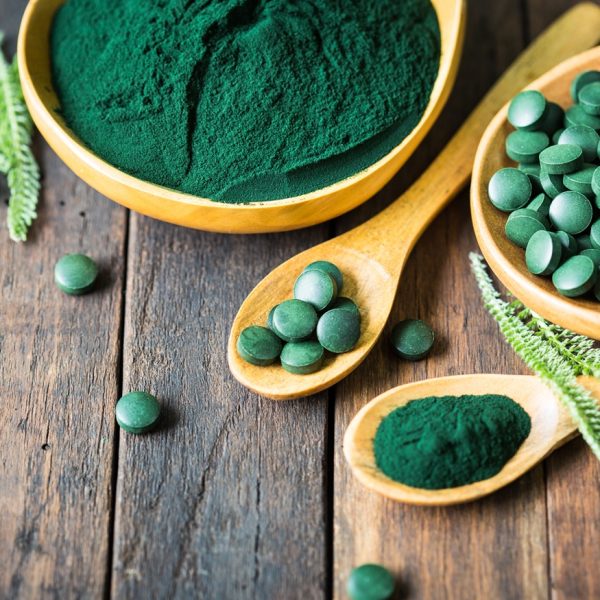Overactive thyroid, or hyperthyroidism, is a condition characterised by an increase in metabolism, affecting heart rate, weight, energy and a myriad of other symptoms.
Understanding hyperthyroidism

Hyperthyroidism, commonly known as an overactive thyroid, is a condition in which the thyroid gland produces excessive amounts of thyroid hormones (1). These hormones, primarily thyroxine (T4) and triiodothyronine (T3), play a crucial role in regulating metabolism, heart rate, energy levels, and temperature. When thyroid hormone levels are too high, it accelerates metabolic processes throughout the body, affecting various systems (1).
In the UK, hyperthyroidism has a notable prevalence, with people assigned female at birth being disproportionately affected. Approximately 2% of people assigned female at birth and 0.2% of people assigned male at birth in the UK experience hyperthyroidism at some point in their lives (2,3). The majority of cases are due to Graves’ disease, an autoimmune disorder accounting for 60–80% of cases, which predominantly affects people assigned female at birth between the ages of 30 and 60 (1,2). Other causes include toxic multinodular goitre and thyroiditis, but these are less common (1). Hyperthyroidism is also relatively rare in children, affecting only 1–2 per 10,000 (4).
How does hyperthyroidism work?

Hyperthyroidism primarily results from excessive production or release of T4 and T3 hormones from the thyroid gland, driven by dysfunction within the hypothalamic-pituitary-thyroid (HPT) axis (1). Under normal circumstances, the hypothalamus produces thyrotropin-releasing hormone (TRH), which stimulates the anterior pituitary to release thyroid-stimulating hormone (TSH). TSH then acts on the thyroid gland, promoting the production and release of T4 and T3. These hormones regulate the basal metabolic rate and impact nearly every organ system (1).
In hyperthyroidism, elevated levels of T4 and T3 override the negative feedback loop, causing TSH levels to fall, but this fails to inhibit thyroid hormone production. The imbalance results in excessive energy production, rapid metabolism, and enhanced sympathetic nervous system activity, often manifesting in symptoms such as increased heart rate, tremors, weight loss, increased sweating and anxiety (1). Thyroid-stimulating antibodies also play a role in certain cases, as seen in autoimmune conditions like Graves’ disease (4).
Understanding the root causes
Overactive thyroid can develop from several underlying causes, with the most common ones including:

Graves’ disease
This autoimmune disorder is the leading cause of hyperthyroidism. In Graves’ disease, the immune system produces thyroid-stimulating immunoglobulins (TSIs) that mimic TSH, stimulating the thyroid gland to produce excess hormones. TSIs are not regulated by the typical feedback mechanisms, which leads to sustained hyperthyroidism. Graves’ disease may also cause Graves’ ophthalmopathy, an eye-related complication seen in some patients (4).
Toxic nodular goitre and thyroid adenomas
This condition involves nodules in the thyroid that autonomously produce thyroid hormones, independent of TSH regulation. These “toxic” nodules lead to overproduction of thyroid hormones, especially in individuals with a history of iodine deficiency. This form of hyperthyroidism is more common in older adults and in regions with iodine deficiency (4,5).
Thyroiditis
Thyroiditis is an inflammation of the thyroid gland that can cause a temporary release of stored thyroid hormones, resulting in transient hyperthyroidism. This condition may follow a viral infection (subacute thyroiditis), autoimmune (Hashimoto’s thyroiditis in its initial stages) or can occur in some people after childbirth (postpartum thyroiditis) (6,7).
Excess iodine
High iodine intake can lead to an overproduction of thyroid hormones, particularly in individuals with underlying thyroid dysfunction. Sources of excess iodine may include dietary supplements, iodine-rich foods, and certain medications, such as amiodarone (used to treat heart arrhythmias) (8).
Thyroid hormone medication overuse
Excessive intake of thyroid hormone medication, typically in treating hypothyroidism, can cause hyperthyroidism if not carefully monitored (9).
Pituitary adenoma
Rarely, a benign tumour in the pituitary gland may secrete excessive TSH, overstimulating the thyroid and causing hyperthyroidism (2).
Signs and symptoms
The symptoms of overactive thyroid are varied, reflecting the hormone’s widespread influence over the body’s metabolism and organ systems (1,5). Common symptoms include:

- Weight loss: Despite a normal or sometimes increased appetite, individuals often lose weight due to a high metabolic rate.
- Increased heart rate and palpitations: Elevated T3 and T4 levels can lead to tachycardia, arrhythmias and palpitations. When the heart is affected, it can be dangerous and it is important to seek help.
- Anxiety and irritability: Excessive thyroid hormones increase sympathetic activity, causing nervousness, restlessness, and anxiety.
- Heat intolerance and excessive sweating: Increased metabolic activity raises body temperature, leading to intolerance to heat, frequent sweating and moist, warm skin.
- Tremors: Fine hand tremors are common due to an overstimulation of the nervous system.
- Fatigue and muscle weakness: People with an overactive thyroid can also experience fatigue. Although metabolism is high, muscles may weaken over time due to increased energy demands.
- Menstrual irregularities: People with an uterus may experience changes in menstrual cycles, with lighter or less frequent periods.
- Goitre: Enlargement of the thyroid gland is sometimes present in overactive thyroids, particularly in Graves’ disease.
- Exophthalmos: In Graves’ disease, inflammation and swelling around the eyes can cause them to protrude, a condition known as exophthalmos.
Herbal solutions

Conventional medical treatments for hyperthyroidism include antithyroid drugs like carbimazole, radioactive iodine therapy, or surgery to remove part or the whole thyroid gland in severe cases (5,10). Herbal medicine offers support in managing hyperthyroid symptoms by addressing symptoms, modulating immune function, and helping regulate thyroid activity (11,12).
It is important to consult a professional herbalist who can advise on the most appropriate herbs to take, and how to take them. It is important not to leave an overactive thyroid untreated as it could lead to serious complications and organ damage (13). A herbalist could also advise whether herbal medicine could support you and refer you to appropriate medical care if needed.
The following herbs have shown promise in studies or traditional use for their effects on thyroid function and related symptoms:
Gypsywort (Lycopus europaeus)
Gypsywort, aslo known as bugleweed, has been traditionally used to help people with an overactive thyroid, with Grave’s disease particularly with cardiac involvement (11,12). It is one of the most widely studied herbs for hyperthyroidism. It appears to inhibit the binding of TSH to thyroid cells, reducing hormone production, as well as preventing the conversion of T4 to the more active T3. It also contains lithospermic acid, which is thought to reduce the production of thyroid-stimulating immunoglobulins, which suggests gyspywort can be helpful in Grave’s disease. Studies have shown that bugleweed can effectively alleviate mild symptoms of hyperthyroidism and may be especially helpful in cases of subclinical hyperthyroidism (14,15).
Gypsywort is contraindicated during pregnancy and lactation and also in patients with hypothyroidism (11). It is also important to avoid this herb concurrently with the drug thyroxine (11).
Motherwort (Leonurus cardiaca)
Motherwort for its calming effects on the heart, motherwort can alleviate heart palpitations and tachycardia associated with hyperthyroidism (11,16). Its anxiolytic properties also make it beneficial for the anxiety and irritability often experienced with this condition. The German Commission E recommends its use for nervous cardiac disorders and as adjuvant for hyperthyroidism (16).
Lemon balm (Melissa officinalis)
Lemon balm has been traditionally used to reduce anxiety and promote relaxation (11). This herb also has mild anti-thyroid effects, potentially by interfering with TSH receptor binding. TSH activity was inhibited through direct binding TSH hormone and also by indirect binding to TSH-receptor sites (17).
Studies have shown that lemon balm can help in reducing the anxiety, restlessness, and insomnia commonly seen in hyperthyroidism (18,19). This makes lemon balm a good therapeutic option for those with overactive thyroid symptoms.
Rehmannia (Rehmannia glutinosa)
Rehmannia is a medicinal plant used in traditional Chinese medicine It supports the adrenal glands and modulates immune function, which can be useful in autoimmune hyperthyroidism (Graves’ disease). It is generally used in combination with other herbs in formulas to manage thyroid and immune function holistically (20,21).
Reishi mushroom (Ganoderma lucidum)
Reishi is well-known as an adaptogen supporting the adrenal glands in periods of stress. Reishi helps modulate the immune system, which can be beneficial in autoimmune hyperthyroidism such as Graves’ disease. Reishi also has anti-inflammatory properties that can reduce thyroid gland inflammation and stress-related symptoms (22).
Holistic solutions
Holistic approaches are essential for managing hyperthyroidism as they target the body’s overall balance, reduce stress, and improve lifestyle factors that can exacerbate symptoms. Some beneficial lifestyle and holistic interventions include:

Diet and nutrition
A balanced diet that includes antioxidants, vitamins, and minerals can support thyroid health. Foods rich in antioxidants (such as berries and leafy greens) help with oxidative stress, and selenium- and zinc-rich foods (such as Brazil nuts and seafood) are essential for thyroid function and immune balance (23). Reducing iodine intake is also advised, if excessive iodine consumption has contributed to an overactive thyroid (25). Avoiding stimulants such as caffeine is also important, not to further stimulate the sympathetic nervous system and to reduce palpitations and anxiety.
Stress management
Chronic stress exacerbates hyperthyroid symptoms by increasing sympathetic nervous system activity. Practicing mindfulness, meditation, or yoga can reduce stress and potentially mitigate symptoms like anxiety, palpitations, and irritability.
Adequate rest
Sleep is crucial for managing the heightened metabolic demands of hyperthyroidism. Ensuring good sleep hygiene and aiming for 7–9 hours of sleep per night can help reduce fatigue and improve recovery.
Exercise
Gentle, regular exercise is beneficial for maintaining muscle tone and promoting relaxation without overstressing the cardiovascular system. Activities like walking, yoga, and swimming can help reduce stress, improve energy levels, and support cardiovascular health.
Acupuncture
Acupuncture may help in regulating the HPT axis and the body’s stress response, making it potentially helpful in managing symptoms of hyperthyroidism. Some studies suggest acupuncture may have a regulatory effect on thyroid function, which supports acupuncture’s role as an adjuvant approach to supporting people with an overactive thyroid (26).
References
- Chaker L, Razvi S, Bensenor IM, Azizi F, Pearce EN, Peeters RP. Hypothyroidism (primer). Nat Rev Dis Primers. 2022;8(1).
- Taylor PN, Albrecht D, Scholz A, et al. Global epidemiology of hyperthyroidism and hypothyroidism. Nat Rev Endocrinol. 2018;14(5):301-316.
- Weetman AP. Graves’ disease. N Engl J Med. 2000;343(17):1236-1248.
- Léger J, Carel JC. Hyperthyroidism in childhood: Causes, when and how to treat. J Clin Res Pediatr Endocrinol. 2013;5(Suppl 1):50.
- Kravets I. Hyperthyroidism: Diagnosis and treatment. Am Fam Physician. 2016;93(5):363-370.
- Bindra A, Braunstein GD. Thyroiditis. Am Fam Physician. 2006;73(10):1769-1776.
- Sweeney LB, Stewart C, Gaitonde DY. Thyroiditis: An integrated approach. Am Fam Physician. 2014;90(6):389-396.
- Roti E, Uberti ED. Iodine excess and hyperthyroidism. Thyroid. 2001;11(5):493-500.
- Ross DS. Subclinical hyperthyroidism: Possible danger of overzealous thyroxine replacement therapy. Mayo Clin Proc. 1988;63(12):1223-1229.
- Vasileiou M, Gilbert J, Fishburn S, Boelaert K. Thyroid disease assessment and management: Summary of NICE guidance. BMJ. 2020;368.
- Fisher C. Materia Medica of Western Herbs. Aeon Books; 2018.
- Bone K, Mills S. Principles and Practice of Phytotherapy: Modern Herbal Medicine. Elsevier Health Sciences; 2012.
- Lee SY, Pearce EN. Hyperthyroidism: A review. JAMA. 2023;330(15):1472-1483.
- Guttuso T, et al. Lycopus europaeus in hyperthyroidism management: Clinical evidence and mechanisms. J Herbal Med. 2021.
- Beer AM, Wiebelitz KR, Schmidt-Gayk H. Lycopus europaeus (Gypsywort): Effects on the thyroidal parameters and symptoms associated with thyroid function. Phytomedicine. 2008;15(1-2):16-22.
- Fierascu RC, Fierascu I, Ortan A, et al. Leonurus cardiaca L. as a source of bioactive compounds: An update of the European Medicines Agency assessment report (2010). Biomed Res Int. 2019;2019(1):4303215.
- Santini F, Vitti P, Ceccarini G, et al. In vitro assay of thyroid disruptors affecting TSH-stimulated adenylate cyclase activity. J Endocrinol Invest. 2003;26:950-955.
- Cases J, Ibarra A, Feuillère N, Roller M, Sukkar SG. Pilot trial of Melissa officinalis L. leaf extract in the treatment of volunteers suffering from mild-to-moderate anxiety disorders and sleep disturbances. Mediterr J Nutr Metab. 2011;4(3):211-218.
- Ghazizadeh J, Sadigh-Eteghad S, Marx W, et al. The effects of lemon balm (Melissa officinalis L.) on depression and anxiety in clinical trials: A systematic review and meta-analysis. Phytother Res. 2021;35(12):6690-6705.
- He Q, Dong H, Gong M, et al. New therapeutic horizon of Graves’ hyperthyroidism: Treatment regimens based on immunology and ingredients from traditional Chinese medicine. Front Pharmacol. 2022;13:862831.
- Dharmananda S. Treatments for thyroid diseases with Chinese herbal medicine. ITM. 1996.
- Bhardwaj N, Katyal P, Sharma AK. Suppression of inflammatory and allergic responses by pharmacologically potent fungus Ganoderma lucidum. Recent Pat Inflamm Allergy Drug Discov. 2014;8(2):104-117.
- Aihara K, Nishi Y, Hatano S, et al. Zinc, copper, manganese, and selenium metabolism in thyroid disease. Am J Clin Nutr. 1984;40(1):26-35.
- Chen Z, et al. Acupuncture and its effects on the hypothalamic-pituitary-thyroid.
- Dunn JT, Semigran MJ, Delange F. The prevention and management of iodine-induced hyperthyroidism and its cardiac features. Thyroid. 1998;8(1):101-106.
- Cheng FK. An overview of the contribution of acupuncture to thyroid disorders. J Integr Med. 2018;16(6):375-383.































